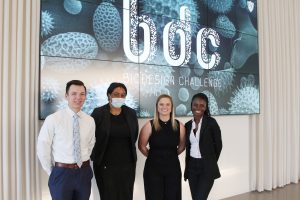This month a team of art, environmental science and engineering students at The University of Toledo named LumniArbor will compete in the international Biodesign Challenge competition using its concept of bioluminescent trees as a solution for both light pollution and the lack of lighting in regions of the world with limited resources.
Alex Mcdonnell, who majors in environmental studies and minors in art; Huriyyah Chaudhry, a bioengineering major; Chinmaya, a bioengineering major; and Nash Benton, who studies civil engineering and minors in entrepreneurship, family and small business advanced to the global stage after winning the 2022 UToledo Biodesign Challenge Wednesday, April 27, at the Toledo Museum of Art Glass Pavilion.

UToledo’s LumniArbor team will compete in the international Biodesign Challenge competition using its concept of bioluminescent trees as a solution for both light pollution and the lack of lighting in regions of the world with limited resources. The team includes Chinmaya, a bioengineering major; Alex Mcdonnell, environmental studies major; Nash Benton, civil engineering major; and Huriyyah Chaudhry, bioengineering major.
The trees, which would be genetically altered to have bioluminescent leaves, would replace existing outdoor lighting in a speculative future. The team argued that, while being bright enough to see by, they would not interfere with the circadian rhythms of nocturnal plants and animals, unlike electrical lighting.
LuminArbor next competes against 54 teams from 18 countries June 20-24.
Students from UToledo prepare for the competition every year through a class offered in the Department of Art taught by Eric Zeigler and Brian Carpenter. The Biodesign Challenge course offers Art, Bioengineering, Environmental Sciences, Civil and Environmental Engineering, and Honors students the opportunity to envision future applications of biotechnology and biomaterials that address complex global challenges.
Students are connected to community experts to develop innovative solutions through interdisciplinary research and iterative prototyping.
This year four teams competed to see which team delivered the best concept for using art, design, science and bioengineering to resolve a real-world problem of their choice.
Another team, Nella Cell, developed a concept for using microorganisms to extract microplastics that leach out of our laundry into the environment. Their composting device, the Nella Cell, also will compete at the international Biodesign Challenge for the Science Sandbox Prize for Public Engagement. This prize is awarded to the team whose project best explores the multitude of impacts biotechnology can have on society.

The UToledo Nella Cell team’s composting device will compete in the Biodesign Challenge’s Science Sandbox Prize for Public Engagement. The team includes, from left, Justin Wank, who graduated in May with a bachelor’s degree in environmental sciences; Kristin McClelland, art major; Kylie Post, bioengineering major; and Eunice Mobula, bioengineering major.
The team members of Nella Cell are art major Kristin McClelland, bioengineering major Eunice Mobula, bioengineering major Kylie Post and Justin Wank, who graduated in May with a bachelor’s degree in environmental sciences.
The other teams competing this year were VerdeTent, which developed a biodegradable tent that could be utilized by people experiencing homelessness, and Indisposable, which improved upon the burial process for humans by repurposing former industrial sites as places where human remains could be safely composted and provide people with a location to visit their deceased loved ones.
VerdeTent members are art major Joe Boorom, bioengineering major Chaitanya Koli, civil engineering major Sam Krouse and Loren Hire, who graduated in May with a bachelor’s degree in environmental studies.
Indisposable team members are bioengineer majors Kaitlin Fugate and Rawan Moussa.
Jurors for the 2022 UToledo Biodesign Challenge were:
• Dr. Heidi Appel, dean of the UToledo Jesup Scott Honors College and professor of environmental sciences;
• Dr. Jonathan Bossenbroek, chair of the UToledo Department of Environmental Sciences and professor of ecology;
• Dr. Mohammad Elahinia, Distinguished University Professor and chair of the UToledo Department of Mechanical, Industrial and Manufacturing Engineering;
• Marc Folk, director of the Arts Commission;
• Dr. Melissa Valiska Gregory, interim dean of the UToledo College of Arts and Letters and professor of English;
• Dr. Kashif Haque, a patent technology associate at UToledo;
• Dr. Adam Levine, director of the Toledo Museum of Art;
• Daniel McInnis, associate professor of humanities at UToledo;
• Barbara Miner, professor and chair of the UToledo Department of Art;
• Dr. Jack Schultz, a retired ecologist;
• Dr. Amy Thompson, former vice provost for faculty affairs;
• Dr. Michael Toole, dean of the UToledo College of Engineering; and
• Robin Whitney, chief strategic planning and real estate officer at ProMedica.